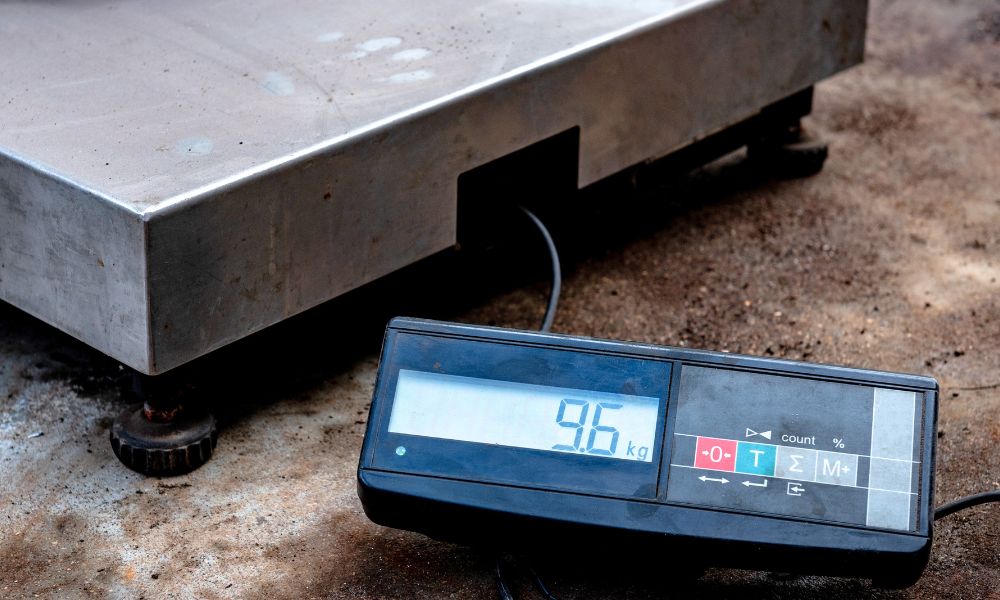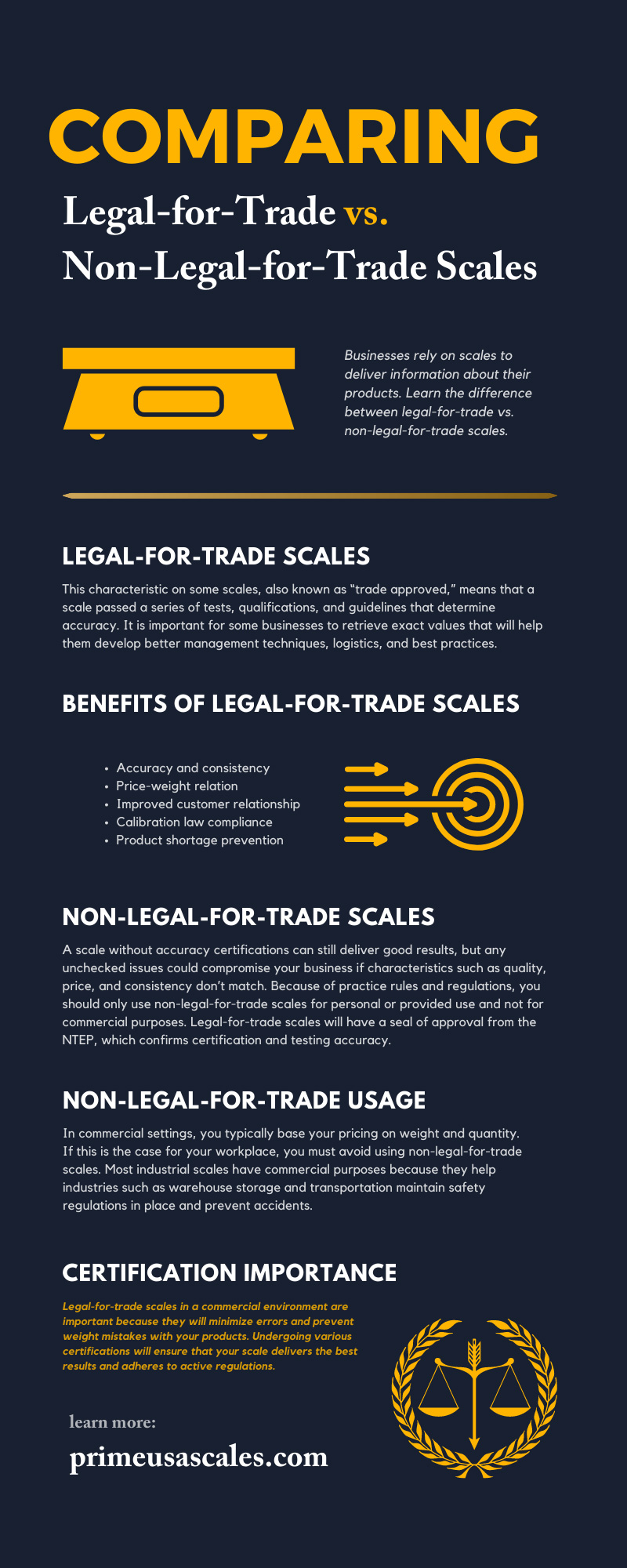People develop new forms of technology and innovate within their industries to achieve better results and help businesses improve. Scales are excellent examples of essential technological tools used across different industries. These devices must provide accurate information about a product for businesses to determine its quality and price.
Different types of scales target different needs, including volume, shape, and size; these characteristics determine which scale will give you the best results. You must check for a scale’s quality specifications and permits to ensure the numbers are right and for your business to see consistent results.
Comparing legal-for-trade vs. non-legal-for-trade scales will help you understand the main differences and choose the best options for your business. Maintaining high-quality and trustworthy results will help you develop a better relationship with clients, improve your processes, and add value to your business.
Legal-for-Trade Scales
This characteristic on some scales, also known as “trade approved,” means that a scale passed a series of tests, qualifications, and guidelines that determine accuracy. It is important for some businesses to retrieve exact values that will help them develop better management techniques, logistics, and best practices.
Any scales that undergo alterations, even after having the seal of approval, must undergo inspection again to ensure that the device has the same characteristics. Legal-for-trade scales will improve efficiency and productivity with simple actions that greatly enhance your business performance.
Non-Legal-for-Trade Scales
A scale without accuracy certifications can still deliver good results, but any unchecked issues could compromise your business if characteristics such as quality, price, and consistency don’t match. Because of practice rules and regulations, you should only use non-legal-for-trade scales for personal or provided use and not for commercial purposes. Legal-for-trade scales will have a seal of approval from the NTEP, which confirms certification and testing accuracy.
That said, non-legal-for-trade scales are more affordable because they come directly from the manufacturer and undergo basic performance checks.
Benefits of Legal-for-Trade Scales
A legal-for-trade scale will keep high standards and consistency and even enhance your business’s best practices. This technology offers various benefits in a commercial environment; these benefits include:
- Accuracy and consistency
- Price-weight relation
- Improved customer relationship
- Calibration law compliance
- Product shortage prevention
These benefits will positively impact your business and deliver a better experience for everyone involved, improving your operation financially and structurally. Choosing the right type of scale with the appropriate certifications will minimize errors and give you the necessary tools to succeed.
Scale Maintenance
Like most industrial and performance machines, scale maintenance is essential for consistency, improving performance, and keeping results accurate. To prevent damage or downtime, performing maintenance once a week will prevent mistakes and ensure safe practices.
Heavy-duty weighing scales require constant maintenance and monitoring because of weight management, sensor accuracy, and performance management. This type of scale, which is popular in the transportation, agriculture, and storage industries, has unique characteristics that enhance organization. However, these scales can only benefit your business if they are in good condition.
Legal-for-Trade Recertification
Legal-for-trade scales require yearly recertification to ensure that they deliver accurate results and that the machine remains functional. The NTEP will recertify and approve your scale so that you can keep using it for commercial purposes in your business.
Industries that work with high-value objects must be careful with this recertification process and maintain consistent maintenance practices. Sometimes accidents happen that could alter the accuracy of the sensors, which could result in monetary losses for a business.
You must make an appointment online to recertify your scale so that a measuring inspector can check your scale and inform you of any necessary adjustments. If you perform any repairs, remove or install new sensors, or change the digital display, you must also submit a request for recertification.
Certification Importance
Legal-for-trade scales in a commercial environment are important because they will minimize errors and prevent weight mistakes with your products. Undergoing various certifications will ensure that your scale delivers the best results and adheres to active regulations.
Your business will increase its value with accurate numbers; sometimes, the weight on a scale can fluctuate, and even this change must have a seal of approval. Having consistent results and a clear process is the best way to keep your business competitive, functional, and thriving.
States have different specifications on scale regulations, so you must check with local authorities to ensure you meet your state’s requirements. Choosing a legal-for-trade scale vs. a non-legal-for-trade option will determine your business’s development. Keep in mind that complying with your industry’s rules and regulations is essential.
Non-Legal-for-Trade Usage
In commercial settings, you typically base your pricing on weight and quantity. If this is the case for your workplace, you must avoid using non-legal-for-trade scales. Most industrial scales have commercial purposes because they help industries such as warehouse storage and transportation maintain safety regulations in place and prevent accidents.
You can use this type of scale for private use, such as weighing livestock on your farm to track development, maintaining safety, or weighing products for storage in your garage. The main purpose of legal-for-trade scales is to maintain a safe and fair environment when selling products in a competitive market for multiple clients.
Improve Legal-for-Trade Results
A legal-for-trade scale requires specific location characteristics to deliver more accurate and consistent results, even with the seal or approval. The space where you place the scale must be an even surface and in a clean area to prevent dust from getting in between the sensors. These characteristics are essential because they will help minimize errors and extend your device’s lifespan. Experience and usage will determine how well the scale delivers results.
Scale Technology
Technology improves processes and provides more accurate results while simplifying practices, and these benefits extend to non-legal-for-trade scales. Inspections and certifications will ensure your scales comply with guidelines and regulations even when results are accurate and consistent.
Scales keep evolving to improve business efficiency, but ensuring that your business has proper inspections and tests will expand your reach. The perfect combination of performance and the right certifications will make your business stand out for the right reasons, keeping you relevant in your industry and opening new opportunities.
At Prime USA Scales, we have the reliable products and certified weights necessary to help your business achieve results and growth. Call us today for a quote and more information on the latest scale technology, products, and tools. Let us take your business to the next degree.

